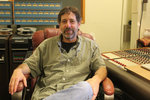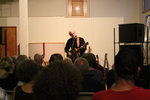He leans in to the microphone. His fingers jolt and scurry over the neck of his guitar, his hand blurs in a tightly controlled frenzy. His voice – harsh yet melodic, like whiskey poured over jagged …
This item is available in full to subscribers.
We have recently launched a new and improved website. To continue reading, you will need to either log into your subscriber account, or purchase a new subscription.
If you had an active account on our previous website, then you have an account here. Simply reset your password to regain access to your account.
If you did not have an account on our previous website, but are a current print subscriber, click here to set up your website account.
Otherwise, click here to view your options for subscribing.
* Having trouble? Call our circulation department at 360-385-2900, or email our support.
Please log in to continue |
|


He leans in to the microphone. His fingers jolt and scurry over the neck of his guitar, his hand blurs in a tightly controlled frenzy. His voice – harsh yet melodic, like whiskey poured over jagged rocks – fills the room.
An untrained observer wouldn't notice much beyond this; a musician, his guitar, his voice, an enraptured audience. Look closer, and see how every aspect of the concert room is a deliberate choice.
The microphone is placed in precisely the right location to augment the singer's voice, the speakers and amplifiers are just the right distance from each other.
The room itself is an instrument. From the amount of carpet on the floor – carpet dampens sound, and can reduce feedback – to the material of the walls.
For Everett Moran, owner of RainShadow recording, the room is everything.
Moran first moved into his studio, located in building 315 at Fort Worden, this March. He plans to turn the space into a mecca for artists interested in recording their music.
THE ROOM, THE SOUND
"My favorite records are the ones where you can hear the room," Moran said.
Some audio engineers attempt to completely nullify the room, attempting to create a vacuum where the physical space adds nothing to the music.
Moran subscribes to a different approach. He hopes his recording studio will add to the music made there.
"I think the best performances are when the band is playing together," Moran said. "When you let all the instruments blend together."
He originally planned on building his own studio in Port Townsend, but when the studio at Fort Worden became available he couldn't turn it down. One of the features that especially attracted him to the room was its high ceiling. He was also drawn to the wider music environment at Fort Worden.
He doesn't have the sound of the room exactly to his liking yet, more experimentation is necessary.
"You don't really know how a room will sound until you stick a bunch of musicians in there and see how it turns out."
A LIFE OF MUSIC
Moran was born in west Texas. He moved with his family to Houston on the day of his 10th birthday. Their first stop was a music store, where Moran's dad bought him his first guitar.
Moran formed his own band in high school, and continued playing with the group through college.
Yet he describes himself as an average musician.
"Our band played really bad," he said. "But did really well financially."
Something else captured Moran's interests in those years: sound.
"I was always the guy who recorded our shows," he said. "That's what got me interested in recording."
He studied theater at the performing arts high school he attended before going on to the University of Texas at Austin, where he majored in lighting design.
The lure of the music industry proved too much for him though – he moved to Los Angeles when he was 20 hoping to land a job at a recording studio.
Prior to moving, Moran sent 100 letters to different studios, trying to get his name out in the industry.
He arrived in LA with two resumes, one with his music and sound engineering background and another one more theatrical based.
"I figured whichever gets me hired first, that's the path I'll follow."
Once situated in California, Moran hit the ground running.
"I traveled to 40 studios in one week," he said. "I'd get up early in the morning and travel to studios on foot."
His efforts didn't pay off. Jobs were in short supply, and Moran didn't find any takers.
It was through personal tragedy that Moran first began work with the music industry.
His grandfather died, and Moran traveled back to Tulsa, Oklahoma for the funeral. While there he struck up conversation with a friend of his grandfather's. That man happened to have a son working in the LA music industry, and he suggested Moran reach out to him. Moran did, and through this connection got his first job, touring with Kenny Loggins as a stagehand.
Moran spent a year touring with Loggins, gradually he was given more and more responsibility, eventually mixing the opening acts and encore.
"It was a great education," Moran said.
After finishing his tour with Loggins, Moran served as technical director with a group called the Bus Boys.
To help pay the bills he also worked at a guitar center on Sunset Boulevard. What he really wanted was work with a recording studio.
"I was getting discouraged," he said. "I thought, 'well at the end of the year if I still haven't found work, I'll move back to Texas and finish school.'"
On Dec. 31, the day of his self-imposed deadline, Moran received a call from a recording studio, which offered him a job as a janitor. He took the work, hoping it would give him opportunities for advancement.
It did. After three months on the job, he was asked to assist a recording session. The only catch: He didn't know how to operate the controls of this particular studio.
"I looked down at the controls and I didn't know what anything was," Moran said.
Luckily he was able to call a friend who talked him through everything, and the session went fine.
Soon after, he took a job at Record 1, another recording studio, as an assistant sound engineer. Moran has mixed feelings about this move, looking back he realizes how valuable his time with Record Plant was.
"I learned from Record Plant how important the sound of the room is."
A 17-YEAR HIATUS
Moran spent nearly two decades out of the industry.
"I didn't like LA," he said. "And I loved Austin."
So he moved back to Texas, hoping to find work as a freelance sound engineer. He found little to no work. No studios had the budget to take him on.
At this time he was married, and had a growing family he needed to support.
So he left music, working for a family-owned business in Oklahoma.
It wasn't until the early 2000's when Moran got involved in music again. He moved to Denver, Colorado, taking a 50 percent pay cut as he went, to record records again.
THE MAD GENIUS
In the spring of 2005 Moran traveled to Texas – supposedly just for a month – to work with Willis Alan Ramsey, and help finish Ramsey's second record. Moran finished the overdubs on the record, and thought everything sounded great. But Ramsey wasn't satisfied.
"Ramsey always felt there was more of the onion you could peel off to make the sound of the record even clearer."
What was supposed to be a month turned into a year and a half.
Moran learned a lot from Ramsey, and considers the time spent working with him a positive experience.
"His madness gave me a lot of inspiration," Moran said. "I knew what I liked in a record."
Ramsey is still working on that record today.
THE PROBLEM WITH DIGITAL
"I'm a big fan of analog," Moran said. "I like the sound of it better."
Analog is recording by non-digital methods, most common manifestations of analog are records or cassette tapes. Moran acknowledges that digital recordings sound wonderful, but he's concerned that recording digitally harms the workflow of putting an album together – by making it too easy for an artist to edit and reedit their work.
"People get obsessed with getting everything perfect," Moran said. "You never hear music that's actually perfect."
Advances in digital are helpful in some ways, Moran said, especially with editing out serious mistakes. There's also less waiting involved with digital recording. Digital allows you to make mistakes and recover from them, he said.
Still, Moran is nowhere near ready to give up on analog.
"It becomes so easy to edit with digital, everyone thinks they can make their music perfect," he said. "Digital takes the humanity out of it, the best groups don't play perfectly."
WHY PT?
Moran and his wife have a long connection with Port Townsend. They spent time here when they first started dating, and they were married here.
His wife was born in Eastern Washington, she didn't particularly enjoy living in Colorado, so they decided to move their family back to Washington.
"We love Port Townsend," Moran said.
They moved their family to the town in 2008.
Moran has spent most of his time in PT gathering equipment for his studio.
He is consistently impressed by the music scene in PT.
"It's really remarkable how many great musicians live here," he said. "This town is endowed with world-class musicians and instrument makers."
He hopes to work cooperatively with other sound engineers in town, he plans to turn his studio into a space available to local artists, and artists from out of town.
"My real goal is to find an artist and try to develop their work," Moran said.
He hopes to have his studio finished by the end of September.